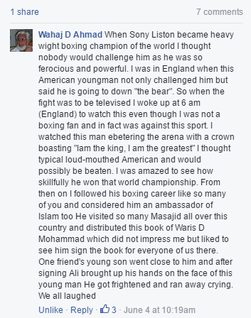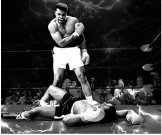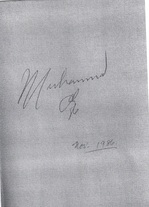|
The Islamic funeral (janazah) of Muhammad Ali was thought-provoking for the American Muslim soul. He was a sportsman, a black man, an American, a rebel, a radical, a force to be reckoned with, a father, a husband, a brother - and a Muslim. I grew up after his heyday, but people from my parents' generation - immigrants - talked about waking up early to watch the inspiring fight, and how his zeal, ferocity, and skill won him admirers around the world.  When I was 10, I got to meet him when he came to Shaw University in Raleigh, NC. He took the time to play-box with us. Parkinson's had already started to slow him down - he could speak but in subdued tones. But I never forgot the humility and magnitude of a man who (in an era before such a photo would have been retweeted around the world in a nanosecond) would take the time to play with children as he completed an historic visit. That was just Ali. A champ. As a lawyer, I eventually read Clay v. United States, 403 US 698 (1971) and understood for the first time what this man gave up for his (at the time) highly unpopular principles. The words of Prophet Yusuf (Joseph) from the Qur'an came to mind: "O my Lord! Prison is more to my liking than that to which they invite me." [Qur'an 12:33] And that's exactly what Muhammad Ali publicly said: "Just take me to jail!" rather than fight in an unjust war. According to one account, the Supreme Court justices had initially voted to uphold his conviction, but were eventually swayed by the sincerity of Ali's beliefs. While the conviction was reversed on what might be termed a technicality, reversed it was all the same.
 Next was the entirety of Surah 89, al-Fajr, "The Dawn." The last 4 verses are especially powerful at a janazah: But as for you, O tranquil soul, return to your Lord, pleased and accepted. Enter among My servants. Enter My Paradise." Of course, Ali is no longer suffering from a debilitating disease. But that's not why his soul is tranquil. A "tranquil soul" is one that has the supreme peace of mind that it did well in this life. It acted to please God, not the self, nor what the government decided was a patriotic duty. It didn't sell out, and it took a principled stand no matter the cost. It was humble enough to realize when it was wrong, and was never too proud or obstinate to change, evolve, grow, mature. It accepted the good and the bad, and never asked why me? It was tranquil. The third set of verses was from Surah 41, al-Fussilaat, or "The Details: "Surely, those who say: "Our Lord is God," and then go straight, the angels will descend upon them: "Do not fear, and do not grieve, but rejoice in the news of the Garden which you were promised. We are your allies in this life and in the Hereafter, wherein you will have whatever your souls desire, and you will have therein whatever you call for, as Hospitality from an All-Forgiving, Merciful One. And who is better in speech than someone who calls to God, and acts with integrity, and says, "I am of those who submit"? Good and evil are not equal. Repel evil with good, and the person who was your enemy becomes like an intimate friend. But none will attain it except those who persevere, and none will attain it except the very fortunate. We don't like blind faith. We are taught to question, to doubt, and to test hypotheses constantly. But there's something beautiful about belief that is pure, but not blind. It is what creates the strength to endure, to persevere. Would Ali have stood up to the US government if his convictions weren't rock solid? Should it matter that his convictions were religious in origin? Those beliefs told him not to fight, not to spread violence and mayhem, and to instead direct effort toward the real source of injustice. Islam requires a steadfast belief in God. And how does one act when they believe in God? Their integrity becomes their calling card. They repel evil with good, and turn their enemies into close friends. It's a tough road - but what about the Champ's life did not require perseverance? Many of us are very quick to shift our goalposts. Our principles are flexible, our ethics situational. In being taught to question everything, have we forgotten how to believe in anything? Have we become so progressive that we stopped progressing out of fear of not being progressive? Bertrand Russell famously said “the whole problem with the world is that fools and fanatics are always so certain of themselves, and wise people so full of doubts." But what if the "fool" is certain that he must do good no matter the cost, whereas the wise person remains stuck in eternal preparation?
Muhammad Ali wasn't the kind of guy who got stuck overthinking. He was no scholar, but he believed in universal truths and he was strong enough to uphold them. Maybe it was that rigorous boxing training, not knowing how to stop at 99% that carried over outside the ring. Maybe it was all that self-confidence - checks he had the balance to cash. The strong black leaders of the 1960's - why does it seem so hard to find people today made out of the same stuff? I like to think we all have that inner strength if we weren't constantly told what to think and how to think it, or being told that belief in something good, without more, is worthless. I've always been proud of my faith as a "thinking" faith. One that invites debate and disagreement. It fit well with my liberal upbringing. But faith is, ultimately, a leap. Logic won't take you very far in matters of faith. But there is something to be said for strength of belief alone channeled into positive contribution. I feel a deeply satisfying reconciliation in the life and times of my brother in faith Muhammad Ali.
1 Comment
|
AuthorHassan Ahmad, Esq. Archives
June 2018
Categories
All
|

 RSS Feed
RSS Feed